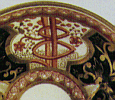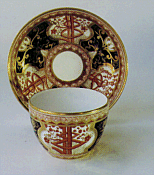Menu

Home Calligraphy Trip to Beijing Focus on Japan Zen Belleza Odiada ConnectedGlobe
To see this page in your own language use the following translation bar.
 I have been always fascinated by the transmigration of images between the East and the
West.There is something very romantic about this journey of the abstract and its vast scope seems
dynamically global.
I have been always fascinated by the transmigration of images between the East and the
West.There is something very romantic about this journey of the abstract and its vast scope seems
dynamically global.
The first time I picked up a cup and saucer (Spode porcelain c. 1810-1830) showing this strange pattern, I could not help
smiling.It was so obvious that the pattern was a child of the imitation and invention of a European
craftsman copying some Oriental patterns.
The characteristic of the pattern is formed by two
horizontal almond shaped circles depicted with two vertical lines in the centre. It made me smile
again when the owner of the antique shop told me that the pattern is called "Dollar Pattern" from its
shape.
 An Oriental pattern interpreted by a European craftsman and named after the American
currency! I had many opportunities to see the same pattern again and again in different places. It
seemed to me that the pattern was quite stylised and conventionalised. The more I saw the
pattern the more I came to be interested in knowing more about its origins.
An Oriental pattern interpreted by a European craftsman and named after the American
currency! I had many opportunities to see the same pattern again and again in different places. It
seemed to me that the pattern was quite stylised and conventionalised. The more I saw the
pattern the more I came to be interested in knowing more about its origins.
 Dollar Pattern is explained in An Illustrated Dictionary of Ceramics on P.98 as
A decorative border used on 17th century ISNIK POTTERY. It takes the form of a figure drawn
like a large S lying on its side between ammonite scrolls. It is actually a degenerate
version of the Rock and Wave Pattern found on 15th century Chinese blue-and -white porcelain.
Dollar Pattern is explained in An Illustrated Dictionary of Ceramics on P.98 as
A decorative border used on 17th century ISNIK POTTERY. It takes the form of a figure drawn
like a large S lying on its side between ammonite scrolls. It is actually a degenerate
version of the Rock and Wave Pattern found on 15th century Chinese blue-and -white porcelain.
 The definition above does not seem to be explaining the so-called "Dollar Pattern" which is found
in Spode porcelain. Probably the above definition refers to an authentic dollar pattern and does
not apply to the"Dollar Pattern" of Spode which is probably a common or popular name used by
dealers. It is obvious that our so-called "Dollar Pattern" is not painted as a decorative border, but a
main pattern in a Cartouche or segmented area. Also it looks more like a pattern depicting
something like a tree rather than rock and wave.
The definition above does not seem to be explaining the so-called "Dollar Pattern" which is found
in Spode porcelain. Probably the above definition refers to an authentic dollar pattern and does
not apply to the"Dollar Pattern" of Spode which is probably a common or popular name used by
dealers. It is obvious that our so-called "Dollar Pattern" is not painted as a decorative border, but a
main pattern in a Cartouche or segmented area. Also it looks more like a pattern depicting
something like a tree rather than rock and wave.

© 2019 Graham G Hawker
Privacy Policy